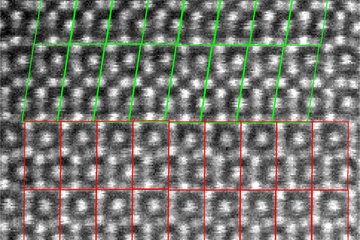All genres
1241.
Talk
Hydrogen enhanced local plasticity - An atomistic study. Spring meeting of the German Physical Society (DPG), Berlin, Germany (2008)
1242.
Talk
Ab initio design of engineering materials: Status and challenges. UCSB-MPG Workshop on Inorganic Materials for Energy Conversion, Storage and Conservation, UCLA Lake Arrowhead Conference Center, CA, USA (2008)
1243.
Talk
Ab initio based modeling of engineering materials: From a predictive thermodynamic description to tailored mechanical properties. UCSB Seminar, University of California, Santa Barbara, USA (2008)
1244.
Talk
First principles Determination of Phase Transitions in Magnetic Shape Memory Alloys. Group Seminar in Materials Department, University of California (UCSB), Santa Barbara, CA, USA (2008)
1245.
Talk
Using Ab Initio to Predict Engineering Parameters in bcc Magnesium-Lithium Alloys. Deutsche Physikalische Gesellschaft Meeting, Berlin, Germany (2008)
1246.
Talk
First-principle study of materials properties in metallic alloys. German-Korean miniworkshop, MPI für Eisenforschung GmbH, Düsseldorf, Germany (2008)
1247.
Talk
Ab intio determination of free energies and phase diagrams. German-Korean miniworkshop, MPI für Eisenforschung GmbH, Düsseldorf, Germany (2008)
1248.
Talk
Molecular Dynamics simulation of dislocations in metals. German-Korean miniworkshop, MPI für Eisenforschung GmbH, Düsseldorf, Germany (2008)
1249.
Talk
Ab initio basiertes Computergestütztes Materialdesign: Von der chemischen Bindung zu realen Werkstoffeigenschaften. Seminar at the TU Clausthal, TU Clausthal, Germany (2008)
1250.
Talk
Optical properties of semiconductor nanostructures, a PW-approach to real-space properties. MRL seminar at UCSB, UCSB, Santa Barbara, USA (2008)
1251.
Talk
From ab initio to materials properties: Accuracy and error bars of DFT thermodynamics. Phonon Workshop, Krakau, Poland (2007)
1252.
Talk
Determination of symmetry reduced structures by a soft-phonon analysis in magnetic shape memory alloys. 2nd Workshop on ab initio phonon calculations, Cracow, Poland (2007)
1253.
Talk
First principles Determination of Phase Transitions in Magnetic Shape Memory Alloys. MRS Fall Meeting 2007, Boston, MA, USA (2007)
1254.
Talk
Ab initio thermodynamic and kinetics based on material design: Present status and perspectives. Seminar at the University of Oxford, Dept. of Materials, Oxford, UK (2007)
1255.
Talk
Eigenspannungen am Hummerexoskelett. Sitzung des FA 13 Eigenspannungen am AWT, IFW Dresden, Germany (2007)
1256.
Talk
Phase stability and mechanical properties of alloys. International Max-Planck Workshop on Multiscale Modeling of Condensed Matter, Sant Feliu de Guixols, Spain (2007)
1257.
Talk
Solid-Solid interfaces. International Max-Planck Workshop Multiscale Materials Modeling of Condensed Matter, Sant Feliu de Guixols, Spain (2007)
1258.
Talk
Ab initio thermodynamics. International Max-Planck Workshop Multiscale Materials Modeling of Condensed Matter, Sant Feliu de Guixols, Spain (2007)
1259.
Talk
First principles study of the anomalous volume-composition effect in Fe-Al and Fe-Ga alloys. 4th Discussion Meeting on the Development of Innovative Iron Aluminum Alloys, Interlaken, Switzerland (2007)
1260.
Talk
Ab-initio study of the thermodynamics and kinetics of N at GaAs(001) surface. PAW workshop 2007, Goslar, Germany (2007)











